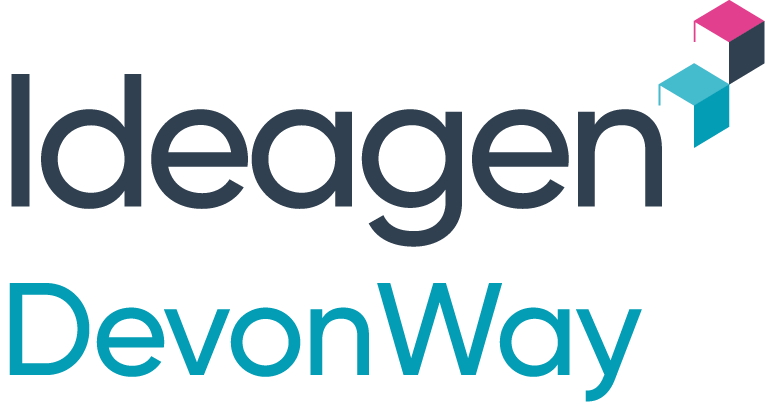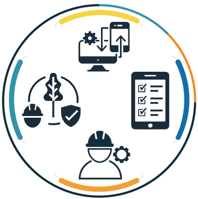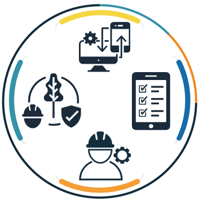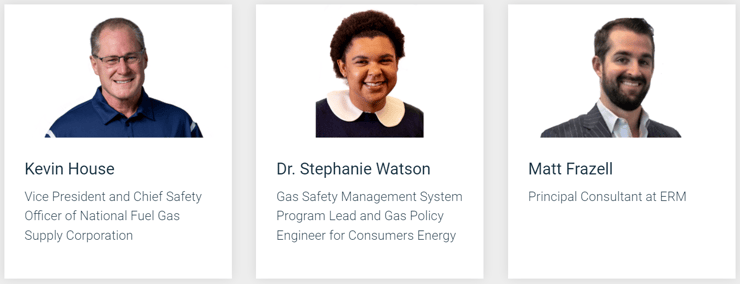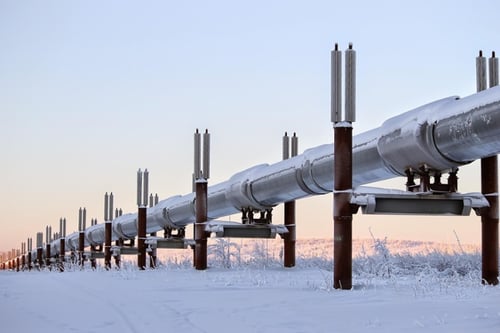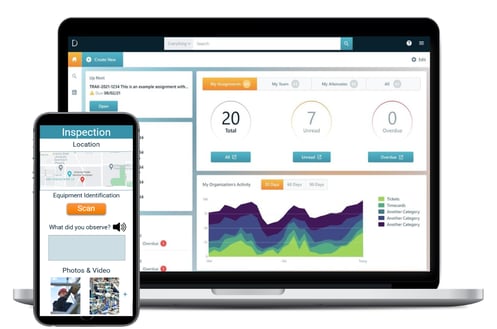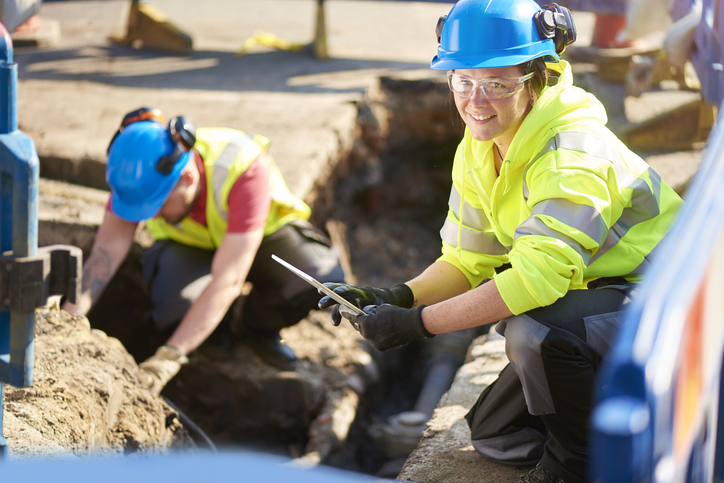
Shifts in key issues for pipeline safety over the past few years require new approaches to Pipeline Safety Management Systems, as a panel of industry safety leaders discussed in a recent DevonWay webinar.
This is Part 1 of several blog posts covering the DevonWay webinar New Approaches to Pipeline Safety Management, featuring panelists:
- Dr. Stephanie Watson, PhD is Gas Safety Management System Program Lead and Gas Policy Engineer for Consumers Energy. She’s responsible for implementation of API RP 1173. Consumers Energy is a DevonWay customer.
- Kevin House, Vice President and Chief Safety Officer of National Fuel Gas Supply Corporation, leads pipeline safety, integrity management, employee safety programs, and business continuity planning for National Fuel’s pipeline and utility subsidiaries. National Fuel is a DevonWay customer.
- Matt Frazell is a Principal Consultant at ERM, where he specializes in the Oil & Gas, Energy, and Petrochemicals. His expertise includes OSHA Process Safety Management, DOT/PHMSA Compliance, and Process Hazard Analysis.
During the webinar, the panel discussed:
- Today's top pipeline safety issues and best approaches to address them
- Tackling the challenges of rolling out a Pipeline Safety Management System
- Measuring pipeline safety progress
- What's next for pipeline safety management
Followed by engaging Q&A from the webinar audience. You can watch the webinar recording here.
First, our panelists shared about their top safety issues and how they're tackling them.
Top issues have shifted to “the human side”
Key issues have changed, as Kevin House explained. Just a few years ago, aging infrastructure and excavation damage topped the list of pipeline safety concerns. “But now, we’re doing a good job of managing these risks in our industry.”
“Our top pipeline safety issues… are on the human side,” he continued. "At National Fuel, [half of] our employees have 10 or fewer years of service and more than a third have less than five years with our company. That leads to increased training requirements."
National Fuel is implementing DevonWay Training Management as part of their DevonWay Pipeline Safety Management software implementation, which Kevin says “will give us the tools that we need to deliver consistent messaging to our frontline field workers” and get updates and input from the field, for example for Near Misses and Good Catches to help avoid incidents.
Engaging with the community
Stephanie agreed. “Inexperience is a significant concern, especially when you consider balancing that with our public engagement. We are constructing at an unprecedented pace…. You have inexperience on the utility or the operator side. You also have a public who may not be knowledgeable about the dangers of the systems that we all operate.
“We used to be responsible up to the point of delivery to a customer. But what does that look like going forward with engagement of our customers and protecting their safety and wellbeing with the commodity that we provide?” Stephanie recommends using communications professionals when conveying pipeline safety information to less technical audiences, internal or external.
Engaging with the workforce on mobile 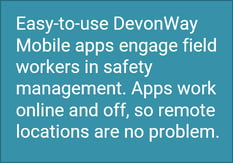
“Taking that one step further,” Kevin added, “not only engaging with the public and our customers, but engaging with our own workforce. A large percentage of our workforce does not have an electronic device or email…. Our IT department is working on making sure that our field employees have electronic devices.”
Engaging with contractors
Engaging contractors is critical, especially because contractors do so much work. For example, Kevin estimates that contractors perform over 50% of work on pipeline replacement projects, service renewals, and more at National Fuel. Engaging contractors “is an area we've identified we need to bring them in the loop,” he said. 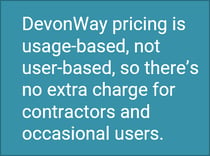
“One of the things that we continue to do with frontline employees is focusing on processes and behaviors,” Stephanie said. "We are training workers and contractors to create awareness around pipeline safety.”
Another way she suggests engaging contractors in safety is to start by understanding how your company works with them, “the two-way behavior with contractors. Because we can't fix what we don't understand.”
Matt sees a trend in how pipeline owners and operators hire contractors. "I'm seeing less about 'who can do the job the cheapest' and more about 'who can do the job in a safe, effective manner and has long-term success as part of their their vision.'"
Visibility, responsiveness, and communication are critical
Stephanie noted that visibility and responsiveness engage people in safety processes. “Reinforcing your Good Catch, Stop the Job, and Near Miss programs is really foundational. That's an area where we've been strong in creating visibility around information that's reported and then what steps were taken to address issues."
Matt summarized “The nature of pipeline operations is that there's risks inherent throughout every phase of operation project lifecycle, and we can manage that risk through better communications.”
"There's a lot of opportunity for us as an industry to continuously improve on how we're communicating with people in the future, when we exit the pandemic," Stephanie added.
That's just one reason why Continuous Improvement is central to Pipeline Safety Management Systems.
Upcoming posts will cover managing the challenges of rolling out a Pipeline Safety Management System, measuring pipeline safety progress, and what's next for pipeline safety management.
DevonWay Pipeline Safety Management
Improve safety culture by engaging employees and contractors. Avoid costly incidents. Gain insights from your data so you can instantly spot trends, take actions, and engage your workforce every step of the way.
DevonWay Pipeline Safety Management software helps pipeline operators quickly and efficiently implement and manage NTSB/API Recommended Practice (RP) 1173. The software bundle includes Audits and Assessments, Corrective and Preventive Actions, Document Management, Equipment Calibration, and core SMS components with Continuous Improvement built in. Other DevonWay products "snap in" when you're ready. Contact us to discuss how we can help you.
Related Posts
Measuring Pipeline Safety Management Progress
Implementing Pipeline Safety Management System software enables you to collect and capture a lot of...
What NTSB/API RP 1173 means for the pipeline industry - DevonWay
Achieve compliance with RP 1173 to improve safety performance Following a devastating environmental...
Independent Research Firm Publishes Case Study on DevonWay EHS, QMS, and Asset Management Solutions
Verdantix, an independent UK-based research and consulting firm with expertise in environmental,...
